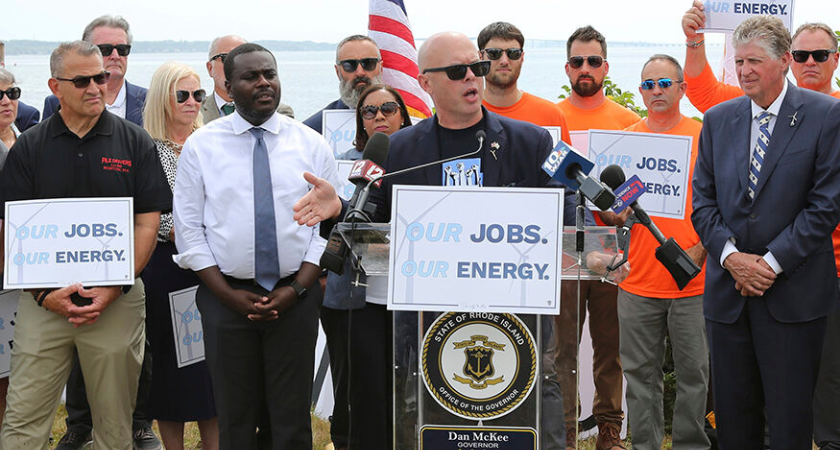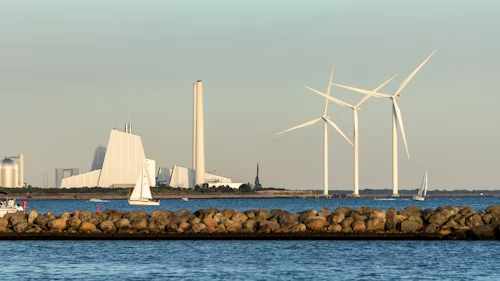
PROVIDENCE, R.I. — Rhode Island, Connecticut, and offshore wind developer Ørsted have filed lawsuits against the Trump administration after federal officials abruptly halted construction of Revolution Wind, a nearly completed offshore wind project designed to power 350,000 homes across the two states.

Rhode Island Attorney General Peter Neronha sharply criticized the move, calling it an “all-out assault” on renewable energy. The states’ lawsuit, filed in U.S. District Court in Rhode Island, describes the project as a “cornerstone” of their clean energy future, one that federal regulators stopped without “statutory authority, regulatory justification or factual basis.”
Ørsted, the Danish energy company behind the project, filed a separate suit in Washington, D.C., also arguing the administration had no legal authority to block construction. The company is seeking a preliminary injunction to move forward on the project, which is already 80% complete, with all underwater foundations installed and 45 of 65 turbines in place.
An Interior Department spokesperson, Elizabeth Peace, said the agency would not comment on pending litigation.
Work came to a halt on August 22 after the Bureau of Ocean Energy Management issued a stop work order, citing unspecified national security concerns.
Interior Secretary Doug Burgum told CNN he feared offshore turbines might distort radar detection systems, potentially masking a “swarm drone attack through a wind farm.” But critics dismissed that reasoning.
Retired U.S. Navy Cmdr. Kirk Lippold called the justification “a specious and false narrative” and said it came from “someone with an overactive imagination in search of a solution to a problem that doesn’t exist.”
“If drones get so close to U.S. shores to be near a wind farm without being detected by the military,” Lippold added, “we have had a massive intelligence — a national security — failure.”
U.S. Sen. Jack Reed, a Rhode Island Democrat and national security expert, also rejected the administration’s rationale, pointing to the Department of Defense’s prior involvement in the review process.
When BOEM approved Revolution Wind in 2023, the agency confirmed the Defense Department had been consulted at each stage. With specific site stipulations, the Pentagon concluded any impact on training or operations would be “negligible and avoidable.”
The permitting and federal review process for the project spanned nine years before approval.

The administration’s action is part of a broader push against renewable energy. President Donald Trump has long derided offshore wind as “ugly” and “expensive,” while emphasizing fossil fuels as the backbone of U.S. energy policy.
“We’re not allowing any windmills to go up unless there’s a legal situation where somebody committed to it a long time ago,” Trump said during a recent Cabinet meeting.
It marks the second time his administration has ordered a major offshore wind project to stop. The first, in New York, was later allowed to resume. The administration is also reconsidering approvals for three more projects: the Maryland Offshore Wind Project, SouthCoast Wind, and New England Wind, which together could power nearly 2.5 million homes.
Massachusetts senators Ed Markey and Elizabeth Warren condemned the move, saying Trump and his Cabinet “need to end their war on American energy and jobs.”
Ørsted says about $5 billion has already been invested or committed to Revolution Wind, and canceling it could trigger more than $1 billion in additional losses. More than 1,000 workers are currently tied to the project.
Rhode Island already hosts the five-turbine Block Island Wind Farm, the first offshore facility in the U.S., but Revolution Wind would be the state’s and Connecticut’s first large-scale wind development, delivering about 2.5% of New England’s electricity needs.
Connecticut invested over $200 million to redevelop State Pier in New London to support offshore wind. Officials warn that stopping the project would undermine years of investment, slow economic growth, and jeopardize clean energy targets.
State leaders emphasize the project’s importance during the winter months, when New England’s electricity demand surges as natural gas is prioritized for heating. The deal for power from Revolution Wind locks in electricity at 9.8 cents per kilowatt-hour for 20 years—a rate cheaper than projected regional averages.
Connecticut’s top environmental and energy official, Katie Dykes, warned of steep consequences: she predicts state electricity ratepayers could face tens of millions of dollars in added costs if the wind farm never comes online.
Originally reported by Jennifer McDermott, The Associated Press in DJC Oregon.